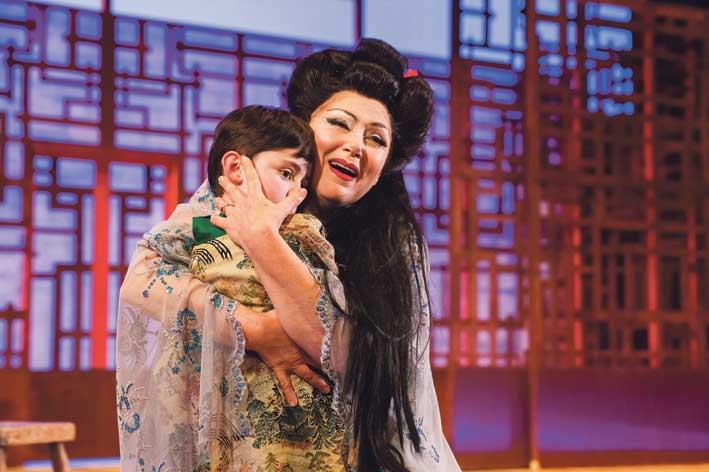Soprano Miriam Gauci's return to the opera stage at the Aurora Theatre in Gozo on April 1st in the title role of Puccini's Madama Butterfly was nothing short of triumphant. From the very beginning to the very end of the production her beautiful voice - angelic in its clarity - was both musically and technically note perfect. But more than that she moulded it throughout to express the combination of vulnerability and torrential emotion that are the main components of the role.
Her performance was further bolstered by well-controlled body language and facial expression. Without upstaging any of the other singers she dominated the stage with her presence interpreting the part with her singing and every inch of her body. Miriam Gauci was indeed Madame Butterfly - Puccini's tragic girl-bride who grows from a trusting teenager to a mature woman - lover and mother.
Madame Butterfly is the last of the three most famous, and best-loved Puccini operas. Puccini got the idea for the opera after watching Belasco's play Madam Butterfly when he was in London. This was based on a short story by John Long, from which Illica plucked out what he wanted for his own, tear-jerking purposes. Meanwhile Puccini researched Japanese folk and national tunes and went to great lengths in order to study the voice patterns and intonations of the Japanese female speaking voice. The result was a score in which themes and motifs tie together details of the action across the whole opera. The composer's supreme orchestration, building in intensity or at other times reducing to almost nothing, affects the pace at which events seem to move, and with his use of instruments, singly and in combination, combines to form his individual language. While it is possible, for example, to chart Butterfly's mood through the use of the Bonze's curse motif and 'The Star Spangled Banner' it is in the delineation of character that the opera remains strongest.
The composer's preoccupation with character was given primary importance by Enrico Castiglione, the artistic director of the present production at the Aurora Theatre. In the opening scene Pinkerton's character mocks the elasticity of Japanese contracts as long as 999 years, but snapping shut in a month if he chooses, regards the Japanese as delicate and toy-like, and sees nothing fine, lasting or valuable in the country. He even goes so far as to toast his real American wife of the future. Such frivolity is sharply contrasted with the more sensitive character of Sharpless, the American consul, who realises immediately that Butterfly was not contemplating the usual Japanese marriage of arrangement, but being actually in love with Pinkerton, is taking it with complete seriousness, even to the extent of having renounced the faith of her forefathers. So also in Act 2 the contrast between the trusting Butterfly and the more wordly-wise Suzuki, Butterfly's faithful maid, and the special relationship that existed between them was beautifully delineated in this production. Removing the blind-folding of Butterfly's three-year-old son and getting him off the stage, while she commits suicide removed some of the melodrama of the final scene and made Butterly's ultimate sacrifice even more moving. Castiglione was also responsible for designing the set that was simple, effective and functional never trying to compete with the music or the action.

Apart from Miriam Gauci this production of Madame Butterfly had two other excellent singers. Baritone Alberto Mastromarino as Sharpless and mezzo-soprano Rossanna Rinaldi as Suzuki. Mastromarino's Sharpless was beautifully sung with a bronze tone and ardent phrasing. Moreover his diction was crystal-clear. He was carefully characterised as a reticent bureaucrat adrift in an emotional situation over which he has no command. Rinaldi's Suzuki was sure-voiced and affecting conveying admirably both the inflexible pride and the affection beneath her devotion to her mistress. In the Flower Duet in act 2 she and Gauci sang off each other beautifully.
Tenor Vincenzo Costanzo, dressed in two rather fanciful uniforms, looked attractively laddish and irresponsible at the start and showed remorse and moral cowardice in the final scenes. He has a fine rich voice but lacked the technical polish of the soprano. This imbalance, however, did not spoil the love duet at the end of Act I, one of the most beautiful pages in opera ever written.
In the pit Colin Attard conducted the Malta Philharmonic Orchestra with passion and a wonderfully instinctive feel for the ebb and flow of the score, to which the Orchestra responded very well. If the entries of the various instruments at the beginning of the opera were rather lacking in crispness, the orchestral interlude following the humming chorus in the middle of act 2 was very good. Occasionally the overall sound tended to overpower the singers.
The excellent costumes in Japanese style, and the singing of the Gaulitanus Choir as well as that of most of the ancillary and minor parts (Roberto Covatta, Louis Andrew Cassar, David Debono, Joseph Lia, Patricia Buttigieg and Ian Grech) helped to make this evening one to be remembered.
This was indeed the highlight of the 11th edition of 'Gaulitana: A Festival of Music' put on by the Gaulitanus Choir that for five full weeks presented no fewer than 21 concerts, besides a number of lectures and master-classes - a festival that over the years has grown in scope and quality.
Photos: Shaun Sultana